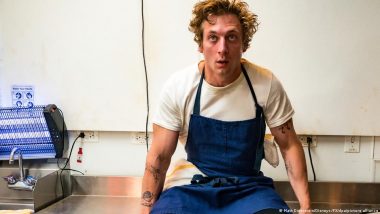The second season of "The Bear" is out. The successful series is part of a media phenomenon of movies, TV shows and documentaries dealing with the world of professional kitchens. What's behind the fascination?The US streaming series "The Bear" was the surprise hit of 2022.
It takes an intimate, vertiginous look at the demands of working in a restaurant. Feverishly paced and with almost painfully authentic images, it gives the viewer the feeling of being right in the middle of the action — to the point that it makes almost palpable the pain felt by main character Carmen "Carmy" Berzatto (Jeremy Allen White) when a roast beef order wasn't made.
Rarely has a fictional TV series portrayed so authentically what it's like to work in a professional kitchen, including the military tone, the verbal and physical abuse, the constant stress and inhumane working hours. The series' depiction of the minefield of kitchen work enthralled viewers and critics alike, a logical next step following decades of fascination with the challenges and triumphs of real-life chefs.
The food show boom
In the United States, that fascination kicked off with the late New York chef Anthony Bourdain's best-selling memoir, "Kitchen Confidential: Adventures in the Culinary Underbelly," an insider's look at the unglamorous sides to the high-end restaurant business, including alcoholism and drug addiction.
The success of that and subsequent books made Bourdain a media celebrity, and until his death in 2018, he hosted several TV shows for various broadcasters that combined travel with eating.
Around the same time in the UK, chef Gordon Ramsay was cursing and yelling his way through documentaries and reality-TV formats, such as "Hell's Kitchen" (2004), cementing the popular image of professional cooking as a harsh and high-pressure environment.
Other successful reality shows include the award-winning "Chef's Table" and its various spinoffs, as well as countless cooking competition shows in seemingly endless configurations, like "Top Chef" and the ever-popular "Great British Bake Off," to name just two.
The topic of cooking as a passion has of course also made its way into fictional genres.
Feature films like "Chocolat" (2000) by Lasse Halmström, Disney and Pixar's animated hit "Ratatouille" (2007), or "Pig" (2021) by Michael Sarnoski and starring Nicolas Cage, depict kitchens as places where sensuality and dreams exist side-by-side with devastating disappointment and tragedy.
And while cooking-themed films and TV shows are nothing new, Austrian film critic and podcaster Christoph Prenner tells DW that the current concentration of offerings is "a relatively new phenomenon." He says the huge number of kitchen stories on offer is "a logical extension of the reality TV trend that has raised chefs to the status of modern rock stars over the past decade and a half."
According to Prenner, series like "The Bear," which allow a glimpse "behind the façade of beautiful appearances" are "overdue, as it were." What surprises the film expert though, is that this shift in perspective is coming from fictional formats like films and TV series, rather than "from the supposedly authentic glossy food porn of the 'Chef's Table' brand."
The world behind the swinging doors
Prenner points out that often, the secondary level of satire or a real-time thriller is necessary to present "the unspoken mechanics and negative sides of a system in a particularly accentuated way."
But he adds that increasing numbers of full-length documentaries have addressed the topic in recent years. Non-fiction films like "El Bulli: Cooking in Progress" (2010) by Gereon Wetzel or "Noma" (2017) by Pierre Deschamps go behind the scenes at top restaurants.
In the past, the world behind the swinging doors remained hidden from diners. Now, most people are familiar with terms such as line chef, sous chef, or executive chef.
"She Chef," directed by Melanie Liebheit and Gereon Wetzel, was released in mid-May in German cinemas. The documentary follows young top chef Agnes Karrasch on her journey from a team victory at a cooking world championship through several high-end dining establishments, including Vendôme near Cologne and Disfrutar in Barcelona, to Koks (Faroese for "perfectionist"), a remote top restaurant in the Faroe Islands, where she meets her boyfriend. In telling her story, "She Chef" almost offhandedly asks important questions about the future of this uncompromising profession, and the compatibility of career and family.
The 2023 Michelin Guide awarded 334 stars to restaurants in Germany; only 11 of them have women as executive chefs. So it's all the more important that with "She Chef," a woman is finally portrayed working in the male-dominated field of high-level gastronomy.
Time for a change
"She Chef" has earned rave reviews from critics, and, as she tells DW, Karrasch has had a lot of positive feedback from her fellow women chefs.
When asked what needs to happen to attract more women to the high-end restaurant business, she doesn't mince words: "Regardless of gender, if we want to find new blood, the working conditions and the tone have to fundamentally change. On top of that, the profession is not very family friendly. But that's not going to change; that's just the cooking profession. You work during the day and in the evening, too." Still, she says she'd like to see more restaurants explore the possibilities of part-time working models.
As in "The Bear," the working conditions shown in "She Chef" have a distinctly military atmosphere.
Asked whether that kind of harsh tone is really necessary, Karrasch says, "There needs to be a certain rigor, clear rules and structures. But the military tone is absolutely not necessary, in my opinion. My boyfriend always likes to say, 'At the end of the day, we're just cooks, we cook food.' We don't save lives, we're not in the military, and we don't go to war." She says it's inappropriate, even ridiculous, to still use that tone in the restaurant business these days.
Striking a different tone
Instead, she'd like to see more emphasis on the leadership qualities of executive chefs and sous chefs: "I think that if you're respected by your team, and set clear standards, it's completely unnecessary" to deal with people in a harsh or even abusive manner.
She adds, "If I'm ever in one of those positions and can change things a bit, then I also have the chance to train cooks who focus more on teamwork and work more respectfully with each other. I think you can achieve just as much that way."
Agnes Karrasch describes a much more positive working atmosphere at her current employer, the Michelin-starred Koks. She says, in that kitchen, it's all right for cooks to ask for help or not finish something, "you just have to let someone know in time." Everyone has different talents, and "that's what we try to point out to our chefs at Koks. We don't take ourselves too seriously, either. We want to deliver quality, of course, and be better each day than we were the day before, but we try to stay grounded."
This article was originally written in German.
(The above story first appeared on LatestLY on Jun 22, 2023 06:40 PM IST. For more news and updates on politics, world, sports, entertainment and lifestyle, log on to our website latestly.com).













 Quickly
Quickly

















